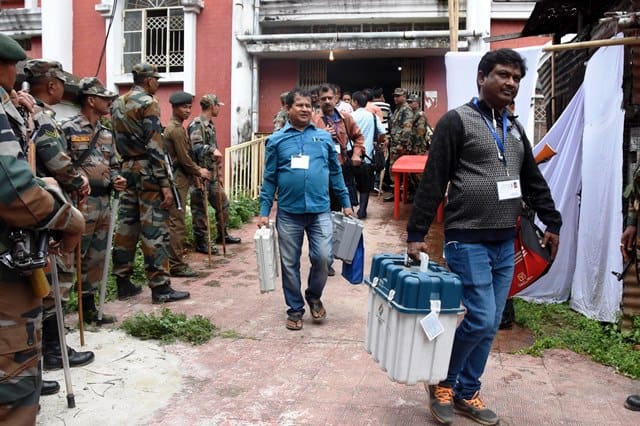
Tag: Lok Sabha Elections 2019

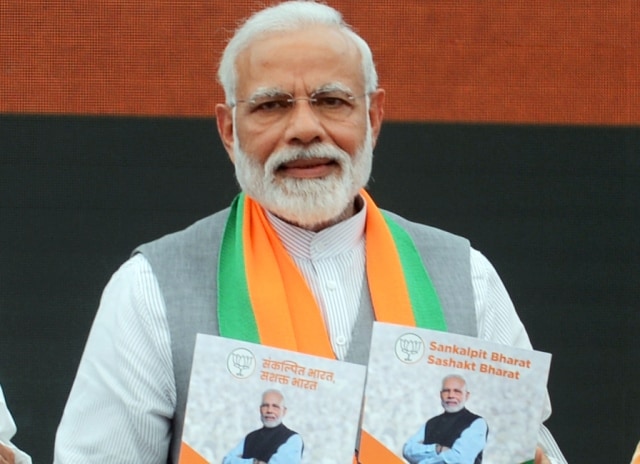
Terror, Security Mainstay Of BJP Manifesto
Terming the manifesto as a vision document for the “New India”, the manifesto promised to create growth opportunities for the people of India as the BJP sought continuity for the sake of stability.
The party that has been highlighting crackdowns on the terror groups by the way of surgical and air strikes in Pakistan, and putting the separatist elements under tight leash, stated in its manifesto that it will “firmly continue” the policy of ‘Zero Tolerance’ against terrorism and extremism and will continue to follow the policy of “giving a free hand to our security forces in combating terrorism.”
In order to strengthen the armed forces, the BJP claims to speed up the purchases of outstanding defense related equipment and weapons. “In order to equip the Armed Forces with modern equipment, we will continue to take focused steps to strengthen the strike capability of the Armed Forces,” the party manifesto stated.
For the welfare of soldiers, the party promises to create a more effective framework for the resettlement of Armed Forces veterans. “Under this effort, the Armed Forces will start planning for the resettlement of soldiers three years before their retirement and in accordance with their preferences. This will include provision for skills training, so skills training, and financial support for higher education, for housing and for starting an enterprise,” the manifesto said.
For combating infiltration, BJP claims to “implement the NRC in a phased manner in other parts of the country.”
The party in its manifesto states that it is “committed to the enactment of the Citizenship Amendment Bill for the protection of individuals of religious minority communities from neighbouring countries escaping persecution.
“We will make all efforts to clarify the issues to the sections of population from the Northeastern states who have expressed apprehensions regarding the legislation. We reiterate our commitment to protect the linguistic, cultural and social identity of the people of Northeast. Hindus, Jains, Buddhists and Sikhs escaping persecution from India’s neighbouring countries will be given citizenship in India,” the party stated.
The party has also reiterated its demand for “abrogation” of Article 370, “annulling” Article 35A in the state of Jammu and Kashmir.
In the Agriculture sector, the party reiterated its commitment to providing Rs 6,000 per year to the farmers as mentioned by the NDA government in its interim budget. “We have launched Pradhan Mantri Kisan Samman Nidhi Yojana to ensure fnancial support to farmers owning land up to 2 hectares. We will further expand the coverage of the scheme to all the farmers in the country…We will launch a pension scheme for all small and marginal farmers in the country so as to ensure social security to them on reaching 60 years of age. We are committed to making an investment of Rs. 25 lakh crore to improve the productivity of the farm sector. We will provide short-term new agriculture loans up to Rs. 1 lakh at a 0% interest rate for 1-5 years on the condition of prompt repayment of the principal amount. Our scheme, Pradhan Mantri Fasal Bima Yojana has ensured risk mitigation and provided insurance cover for all farmers. We will make enrolment of farmers under the scheme voluntary,” the manifesto read.
In addition it talked about launching Oilseeds Mission, building efficient storage and transport mechanism for agriculture produce, launching National Bee-keeping and Honey Mission to ensure additional returns to the farmers.
The manifesto said that in order to make India the third largest economy of the world by 2030, and committed to make India a $5 trillion economy by 2025 and $10 trillion economy by 2032.
For the welfare of small traders, the party promises to “establish National Traders’ Welfare Board and create a National Policy for Retail Trade for the growth of retail businesses. The BJP stated that it aims to take the Credit Guarantee Scheme credit to Rs.1,00,000 crore by 2024.
To ensure urban development, the party has vowed to set up five regional centres of excellence on urban issues. These centres will provide support to states and local bodies on issues of urban governance and growth.”
“We will launch a National Urban Mobility Mission to provide technology based urbanmobility solutions to all urban local bodies and increase the use of public transport, enhance walkability and cycle use… In the next five years, we will ensure that 50 cities are covered with a strong metro network,” the manifesto states. (ANI)
]]>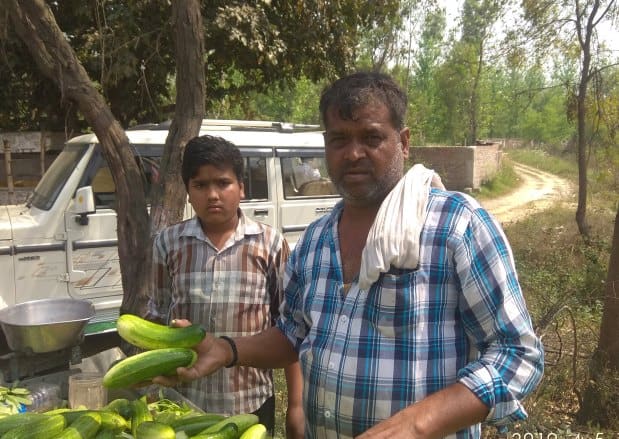
Rally Report – ‘Rallies Good For Business’
Chandrapal, 54, from Khatauli in Uttar Pradesh, set up a pushcart full of cucumbers at the venue of Narendra Modi’s rally in Amroha on April 5. He favours neither the Congress nor the BJP. “My family is my first concern and such rallies help me make an extra buck for them,” he tells LokMarg.
I have a family of six to take care of. Two of my children go to school too; their fees and uniforms are a major setback. I sell vegetables and fruits at Khatauli (in western Uttar Pradesh) market every day for a living. My first and foremost concern is how to increase my income. And I have little faith in political parties or their leaders to be take care of my interests. I will have to deal with them myself.
We lead a tough life, with little time for entertainment like these (pointing out to the mad rush at the BJP rally in Amroha). For us, such large gatherings are an opportunity to eke out some extra income. Whenever I come to know about a political rally in the vicinity close to my work place, I grab the opportunity. And I am not alone in this. Take a look at the sugarcane juice sellers or other refreshments.
Your judgment about what you are going to sell works a lot. Since it is getting hot in the day, I chose cucumbers. They are cheap, within the budget of a villager and cools down the parched men. Of course there are several options; one has to choose that one can handle. If I end up with some surplus, I can use it on my vegetable stall for the next few days.
I am teaching these tricks of the trade to my son, Sooraj, who is here with me. He is studying in Class XI. I do not want him to become a vegetable vendor but he is a good helping hand, and it is never too early to learn the ways of the world. The business a bit slow right now. But I am sure, when the rally ends, there will be a rush of thirsty men towards the main road. I hope I am able to return with an empty cart. This is the dream of every vendor that he does not have to carry any of wares back home. I too hope I made the right decision by betting on the cucumber.
]]>

MissionShakti – ‘Mind Earthly Matters’
Sudesna Santikari, a senior counselor with the West Bengal AIDS Control Society in Kolkata, feels that India’s entry into an elite space club after Mission Shakti is a matter of pride, but people should not get carried away by it and vote wisely by taking real issues into consideration.
When people heard that Narendra Modi had tweeted about making a ‘big announcement’, several people got anxious. Was it going to be something similar to demonetisation? But most were pleasantly surprised when the suspense finally unfolded. The Prime Minister announced that India had achieved Anti-satellite technology. I felt proud as details of Mission Shakti started trickling in my news feed.
Kudos to the scientists at Defence Research and Development Organization (DRDO). A satellite that was shot down was a pre-determined target orbiting at an altitude of 300 km. And all this was achieved in three minutes flat! We are now part of an elite club of countries including U. S., Russia and China that have this technology at their disposal.
This is surely a great strategic move and I hope the technology is used wisely. A lot of people get swayed by such strategic advancements and resort to war mongering, while ground realities of poverty, access to good healthcare and education are conveniently brushed under the carpet. These issues are of utmost importance and therefore, I feel that it is very important to choose your Member of Parliament wisely.
Has your MP worked for your area? What do the other candidates offer? It is very important to find answers for these questions and vote wisely rather than get carried away by what is happening at the Centre. Yes, India has another feather in its ‘space cap’, but local issues need attention too. The existing MPs need to pull up their socks, for the janta will take into consideration the work they have done for their constituency before deciding on their vote.
I feel the rotational democracy is the best system for a country like ours where people are so sharply divided along political lines. When our leaders know they have to wait five years for the next chance to be in power, perhaps they will start behaving more responsibly towards local issues. That would bring about some healthy competition too.
I feel we would have more such proud moments as a nation then and would not have to wait for only a Mission Shakti to make us feel proud, happy and safe.
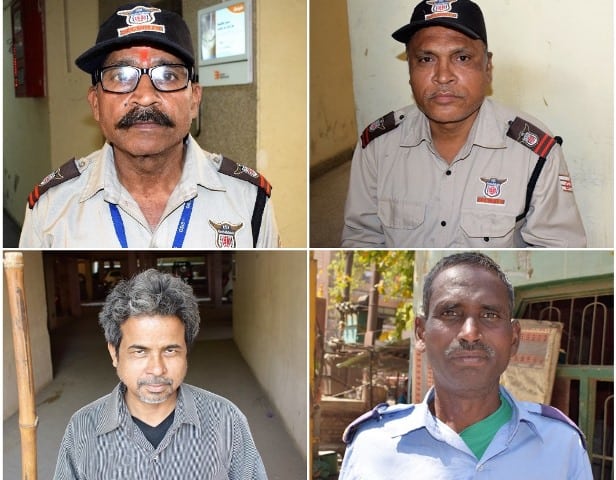
WATCH – The Real Chowkidar Speaks Up
LokMarg went out on the streets of Delhi-NCR to engage with a number of real life chowkidars (security guards) to gauge the mood of the community after Prime Minister Narendra Modi put the focus on their profession by calling himself a chowkidar.
Out team spoke to Ratan Prasad in Loni, Delhi-Uttar Pradesh border, Rajkumar in Delhi, Pramod Shukla from Ghaziabad and Jungbahadur from Pilibhit. They talk about their grueling work hours and the little that the government has done for them. However, their response to who they are going to vote for in the coming elections will surprise you no end. Do watch, comment and share.
For more such videos, go to our YouTube channel LokMarg here.
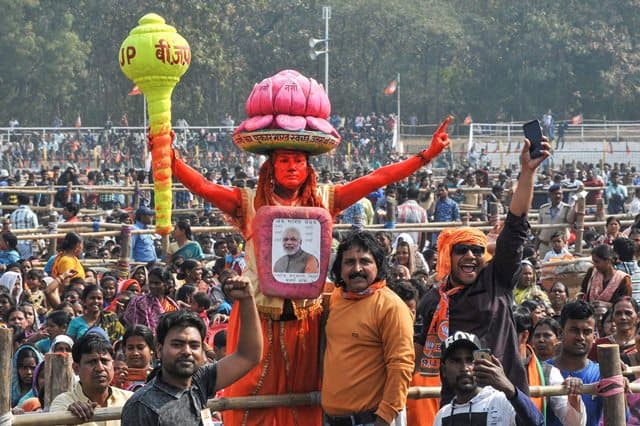
Will Lok Sabha Polls 2019 Be A Referendum On Modi?
The world’s largest democracy, a major economy but by no means prosperous, India is also the most expensive when holding its elections.
Its 2014 democratic exercise cost as much as the United States’ 2012 presidential elections, when Barack Obama was re-elected. The one beginning next month, estimated by New Delhi-based Centre for Media Studies, may cost $ seven billion, or INR 50,000 crores.
Another calculation by political scientist Milan Vaishnav is of a whopping $10 billion, based on growth in expenditure incurred for two polls conducted in 2009 and 2014. The US spent much less, $6.5 billion while electing Donald Trump in 2016.
These huge sums do not come only from the state that funds conducting of the polls. Contestants receive contributions, overt and covert, from businesses, corporate sector and the untaxed and largely invisible farm income. Experience shows that they are made with the understanding that the next government will tweak laws to help recover that money. This breeds corruption.
Should such an expensive exercise be a cacophony that it now seems?
With three weeks to go, the air is thick with hyper-nationalistic fervor triggered by last month’s terror attack in Kashmir followed by India-Pakistan aerial stand-off.
Tensions have subsided but not really ended. Speculation persists over its resumption, should there be another incident on the border or in India-controlled Kashmir. Such eventuality, assuming the world community (mainly the United States) is surprised again, is certain to sweep all other issues out of the polls.
Leaving aside madcaps (there are some on both sides of the Indo-Pak border) who think that India engineered the Pulwama attack, it seems god-sent for Prime Minister Narendra Modi’s government and the ruling alliance.
To his credit, Modi did act tough, defying the nuclear threshold that has prevented a larger conflict, but not stopped Pakistan from using its so-called “non-state actors” for staging terror attacks. This was something his predecessors Manmohan Singh (in 2008 Mumbai terror attacks) and Atal Bihari Vajpayee (Kargil-1999, and attack on Indian Parliament-2001) had not. Modi then swept the nation mounting an “I will not let the country down” campaign, converting the polls campaign into one referendum on national security.
His party, its ideological affiliates and a huge army of cyber warriors troll anyone critical of security lapses and/or seeking details of what precisely happened on the border.
The elections are now divided pre and post-Pulwama. The opposition is on the back-foot. As loyalty to the nation of those who ask questions, howsoever legitimate, is questioned, undoubtedly, this means political/electoral gains and losses.
People across the spectrum — media, academics and security experts among retired soldiers and diplomats – even individual families – are divided. Some ruling alliance stalwarts have gleefully given themselves more seats than they hoped to win earlier in parliament and state legislatures thanks to the border incidents. With Modi being projected as the superhero pandering to popular yearning of a strong leader, the pitch is queered against the opposition.
However, past electoral outcomes have been mixed and indicate that there are limits to all this. For one, Kashmir and war with Pakistan do not resonate in India’s south as they do in the north and the west. Polls were won after conflicts, but not swept, be it in 1971 when Congress’ Indira Gandhi helped breaking-up of Pakistan and emergence of Bangladesh. BJP’s Vajpayee got the same numbers after the Kargil conflict in 1999.
Electoral verdicts do not always match popular sentiments. The BJP lost in Uttar Pradesh 11 months after its cadres demolished the 16th century Babri Masjid in 1992. And although it dubbed Manmohan Singh India’s “weakest prime minister” and BJP veteran L K Advani used the pejorative ‘nikamma’ (hopeless) after the terror attacks in Mumbai in 2008, the Congress improved its parliamentary majority and Singh got a second term.
But popular sentiments yielded results post-“surgical strikes” in Kashmir in 2016 by Modi Government. The BJP swept the polls in Uttar Pradesh despite the miseries caused by demonetization of the currency. Political engineering helped consolidation of the majority community’s vote at the expense the minority Muslims.
Most populous UP is the principal battleground now where the BJP is being seriously challenged by Samajwadi Party and Bahujan Samaj Party. Credible reports indicate that the Modi campaign is working. That 11 of the 44 soldiers who died in Pulwama were from the state matters. But, this is as-of-now, since the difficult-to-fathom public mood can change. And none can fathom how the rural mind, in UP and elsewhere, perceives these polls.
Arguably, the public at large is more worried about dal-roti. If it is looking for options other than Modi, it doesn’t find credible faces among the opposition. What began as Modi-versus-the-rest effort has stuttered. Some contenders have emerged following state-level alliances, but a credible national alternative is absent.
The communists who forged alternative fronts in the past, providing political edge by helping formulate socio-economic common minimum programme have become irrelevant.
Next, the Congress has failed to accept allies and also being acceptable as a key opposition driver. Its alliance-making is non-starter. Its past gives it a misplaced sense of entitlement. Rahul Gandhi, despite his belated surge at the national level in the last one year and winning in three key states, cannot match up against the prime ministerial ambitions of numerous state satraps.
The impact of its ‘brahmastra’, the most potent weapon Priyanka Gandhi, will be known only when results are out. Rahul’s Ailing mother and former party chief Sonia is contesting to save her turf. Those who yearn for Congress’ return, if only as a lesser evil, may be in for a disappointment.
The Pulwama plank seems to have stonewalled the Rafael deal debate. It also excludes any discourse on day-to-day issues, especially on the troubled economy. The government version dominates through its massive propaganda machinery. Bulk of the media, both mainstream and social, the key urban drivers, are divided on pro and anti- government lines.
Politicians are generally not economists. And even if they are, they remain politicians first. Modi too is a politician, and a good one at that. All his major moves are politically motivated. His deft political engineering, now topped with “Pulwama patriotism”, has muted discussion on unemployment with job growth at its lowest in 40 years after statistics officially put out but discredited by the government itself.
His government continues to project demonetization of 86 percent of the currency notes three years ago in terms of curbing black money and denial of funds to militant bodies, when subsequent indicators have shown otherwise.
Falling exports have yet to catch up the 2013-14 level. Industrial growth in January slowed down to 1.7 percent compared to the 2.6 percent in factory output in December last year. The GDP remains under-7 percent.
Equally serious is the farm distress. Thousands unable to repay debts have committed suicide. Minimum support price for farm produce and waiving of farm loans have come too late in the day. Low inflation has been driven by falling food prices, cutting farmers’ incomes and pushing up debt levels. About 800 million depend on farming for their livelihood.
With Saudi Arabia, the largest source, committed to production cuts to keep crude oil prices low, it seems unlikely that India’s fuel and energy costs, a key factor for the economy, will stay soft for long. And with political parties opening the spending spigot in a bid to woo voters, inflationary impulses will quicken.
Modi remains way ahead of his rivals. But there is a risk to democrcy. Political analyst Vijay Sanghvi says Modi has isolated himself thanks to his governance style. “He has reduced the status and stature of every minister and party leader. No one informs him of rampant growth of corruption at lower levels. Unemployment is more hurting as low grade jobs are lost.”
The newest campaign slogan “Modi Hai toh Mumqin Hai” (It’s possible with Modi) reinforces this and places him as the centerpiece of a nationwide campaign.
This election is for the soul of India and its pluralism. But it would also be a referendum on Modi.
The writer can be reached at mahendraved07@gmail.com
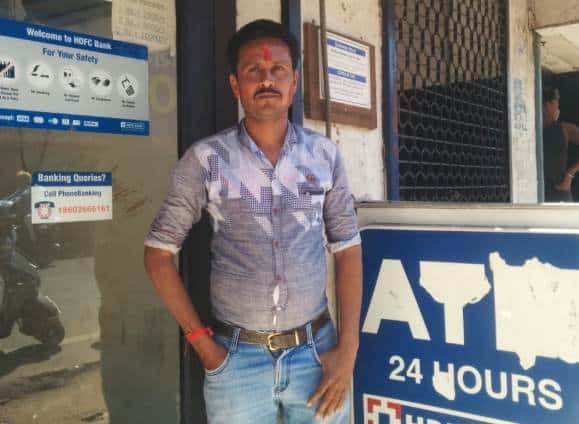
RealChowkidar – ‘It Mustn’t Remain Jumla’
Meet Ranjit Rai, a 36-year-old security guard from a small town in Jharkhand. He is thankful to Narendra Modi’s #MainBhiChowkidar campaign for bringing chokidars into the limelight.
I am an ATM security guard. I have been in the ‘security line’ for about a decade. So, yes I belong to the ‘chowkidar’ community that is in vogue now, be it television channels or political campaigns. Our Prime Minister Narendra Modi’s campaign may not have changed any ground situation for the ‘chowkidars’ but at least his slogan has put the spotlight on our thankless work.
Another positive thing is that now I find a little pride in saying that ‘main chowkidar hoon’; there is no longer any lowliness attached to my vocation. I find it surprisingly funny how it took a comment by the prime minister for people to finally spare a thought for the likes of us.
Hopefully, with so much debate about us these days, things will change for better when the new government is formed. I can only pray that ‘Chowkidar’ doesn’t remain a ‘chunaav ka jumla’ (political slogan).
Earlier, I used to work in a sweet shop. Those were hard times. As a security guard, my life improved a notch better. I work in an 8-hour-shift every day. I get my salary on time unlike many others. However, I continue to be a part of India’s vast unorganised sector. My salary is Rs 10,000 a month, which is just not enough to support a family of six (even in a small town like ours).
Both BJP and the Opposition have got a conversation started about the unorganized sector and I am thankful for that. However, I wouldn’t want my children to join this profession. Things move very slowly in the unorganised sector. I am trying to provide them with good education in the hope of a better future. However, sometimes it gets difficult to make ends meet. Our expenses are shooting through the roof and my salary is just not enough. Our work deserves respect. During demonetisation, it was us, the real chowkidars, who had to handle massive crowds of angry and impatient people. With the risk involved and the hectic schedule, our salaries should definitely be increased.
Whichever party forms the government, it needs to think about bringing us ‘chowkidars’ completely under the organised sector so that we get on-job facilities as well as post-retirement benefits. Besides this, functional CCTV cameras and air conditioners in ATMs, (especially in semi-urban and rural areas) would make our lives a tad easier.
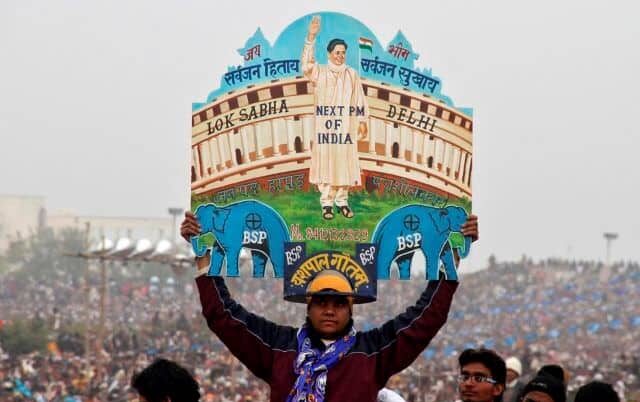
Mayawati Not To Contest LS Elections
BSP chief Mayawati on Wednesday announced that she will not contest the ensuing Lok Sabha elections. She told ANI that it is more important for the SP-BSP-RLD alliance to win each and every seat it is contesting rather than her winning the polls.
She, however, laid stress that if needed, post elections, she can easily make her way to Lok Sabha by asking one of her MP’s to vacate a seat for her.
“If I will contest then my party workers, despite of my telling them not to do so, will spend all their energy in campaigning for me in the particular Lok Sabha constituency I choose to contest from. This will certainly not be in the interest of the party,” said Mayawati.
“It is more important for the (SP-BSP-RLD) alliance to win each and every seat it contests on rather than me winning the elections. If the opportunity arises after the election then I can easily make my way to Lok Sabha by asking someone to vacate his seat,” she added.
SP-BSP-RLD are contesting Lok Sabha polls in alliance in Uttar Pradesh. The RLD is contesting on three Lok Sabha seats, SP is contesting on 37 seats and BSP on 38 respectivily. The alliance has left two seats–Rae Bareli and Amethi–for the Congress.
Lok Sabha elections are scheduled to be held from April 11 and will go on till May 19 in seven phases. The polls in Uttar Pradesh will be held in all seven phases. The counting of votes will take place on May 23. (ANI)
Expect No Miracle But Priyanka Makes polls Exciting
As political parties in India get ready for the mother-of-all electoral battles, Priyanka Gandhi Vadra has emerged as the X-factor in the forthcoming contest.
Her formal entry into politics nearly two months ago as Congress general secretary in-charge of eastern Uttar Pradesh created a buzz in political circles. For starters, Priyanka succeeded in galvanizing an otherwise frustrated and dejected party cadre.
Always seen as a natural and instinctive politician unlike her brother Congress president Rahul Gandhi, Congress workers had been clamouring for years that Priyanka is given a larger role in the party. Her resemblance to her grandmother Indira Gandhi, her easy connect with people and her ability to give speeches in flawless Hindi had convinced the party rank and file that Priyanka indeed possesses the Midas touch to turnaround the Congress’s fortunes, not just in Uttar Pradesh but across the country.
However, Priyanka is a mystery for the Congress party’s political opponents. The Bharatiya Janata Party was, of course, quick to attack the Congress for promoting dynastic politics when Priyanka was appointed party general secretary. The BJP followed it up by highlighting her husband Robert Vadra’s involvement in dubious land deals. At the same time, the Modi government fast-tracked pending inquiries against Vadra soon after Priyanka’s plunge into politics. Her decision to back her husband and her public declaration that she “stands by her family” baffled the BJP as it did not know how it should react to Priyanka the politician. The Bahujan Samaj Party and the Samajwadi Party, which left the Congress out of their seat-sharing arrangement in Uttar Pradesh, is also wary about the impact Priyanka could make in this electorally-crucial state which sends 80 members to the Lok Sabha.
After its initial acerbic comments on Priyanka, the BJP decided to ignore the new Gandhi in the field. On her part, Priyanka also went underground after making a splash with a roadshow in Lucknow. The Pulwama attack and India’s retaliatory air strike against Pakistan sent the Congress into a tailspin and forced it to put its political activities on a temporary hold. Priyanka’s much-awaited press conference was called off while her tour programme was deferred. With the BJP riding high on its nationalist agenda, it appeared that the euphoria over Priyanka’s political debut had waned.
But now that the Lok Sabha election is round the corner and the country is in the grip of feverish political activity, Priyanka has come out of her shell. This will force the Congress party’s political rivals to reassess Priyanka’s political role.
After keeping a low-profile for the past two months, the new Congress general secretary finally addressed her first public meeting and, that too, in Ahmedabad, Prime Minister Narendra Modi’s home turf. Her brief, understated speech referred to the Modi government’s failure to deliver on its promise to create more jobs while drawing attention to farmers’ woes and the issue of women’s security but without naming the Prime Minister.
At the same time, Priyanka has embarked on her first tour in Uttar Pradesh including a boat ride down the Ganga, from Prayagraj to Varanasi. Modi’s Parliamentary constituency. Undoubtedly, Priyanka is familiar with Uttar Pradesh. She has been managing both Rahul and Sonia Gandhi’s Lok Sabha constituencies, Amethi and Rae Bareli, for several years now. But so far, she confined her activities to the two Nehru-Gandhi bastions. She is now stepping out of this safety zone and in a new role. Her public foray will be monitored closely by her own party and its rivals as each one seeks to assess how people are reacting to her and whether she can live up to her reputation as the Congress party’s trump card.
But Priyanka has a tough job at hand. The Congress has been reduced to a bit player in Uttar Pradesh, having lost its traditional support base of Brahmins, Dalits, and minorities to the BJP and the two regional forces, the Samajwadi Party and the Bahujan Samaj Party. With a defunct party organisation and no social base, Priyanka requires more time to get the Congress back in shape. She was given charge of Eastern Uttar Pradesh barely three months before the election which certainly does not give her sufficient time to build a cadre and carve out a social base for the Congress.
As it is, Priyanka has to contend with a resurgent BJP, which got an impressive 42 percent vote share in the 2014 Lok Sabha election in Eastern Uttar Pradesh, the area under her charge. At the same time, the SP-BSP combine, which brings together the social forces of Dalits, Yadavs, and minorities, also poses a tough challenge as it has an equally strong presence in this region.
The Congress is hoping that Priyanka will succeed in disturbing the BJP’s Brahmin vote and reach out to Dalits and minorities, particularly women, youth and workers. It is a tall order but in the process of rebuilding and strengthening the Congress, the party may end up helping the BJP as her outreach has the potential of dividing the anti-BJP vote. It is unlikely that Priyanka’s presence will work instant miracles.
The Congress rank and file will possibly have to wait till the 2022 assembly election to find out if Priyanka has what it takes to pull the party out of oblivion. After all, Rahul Gandhi did say that Priyanka is here for a long haul.
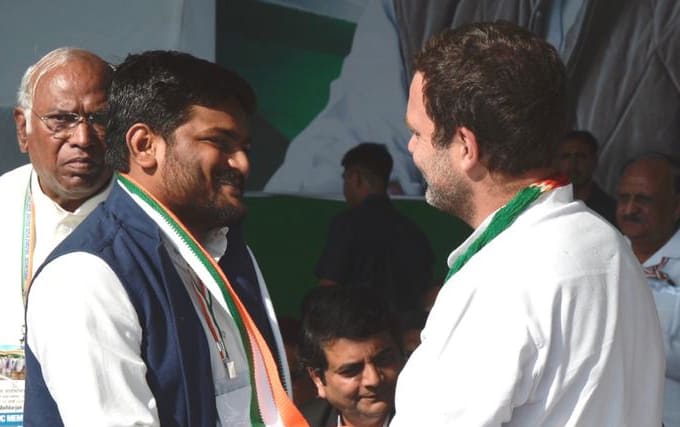
Hardik Patel Joins Cong Ahead Of Polls
Patidar Agitation leader Hardik Patel officially joined Congress party on Tuesday during a party rally in Ahmedabad that was organised after the Congress Working Committee meeting held in the city.
Patel was inducted into the party in the presence of Congress president Rahul Gandhi, senior Congress leader Mallikarjun Kharge and other leaders.
Speaking to media in the city, Congress leader Rahul Gandhi said Hardik Patel would surely emerge victorious in the upcoming elections.
Earlier today, Hardik had said he would help strengthen the ideology of Congress party and take it to the villages.
“Mahatma Gandhi started Dandi March this day and said he (Mahatma Gandhi) will overthrow the British. I am joining the same Congress party which, in the past, has been led by Subhash Chandra Bose, Pandit Nehru, Sardar Patel, Indira Gandhi, Rajiv Gandhi, the people who worked to strengthen our country,” he had said.
However, Patel said the party would decide the seat from where he would contest polls.
Patel emerged as the leader of the agitation demanding reservation for the Patidar community in Gujarat in 2015. The people from this community were considered to be bedrock supporters of the BJP. (ANI)